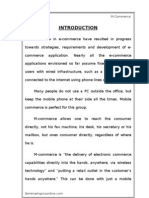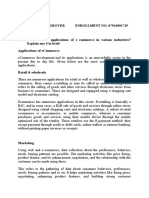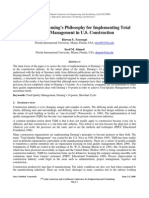÷ M÷M÷÷M ÷ M MMM ÷÷MMMMMMMMMMMMMMMMMMMMMMM MM M÷ M
÷ M÷M÷÷M ÷ M MMM ÷÷MMMMMMMMMMMMMMMMMMMMMMM MM M÷ M
Uploaded by
Ahmed JavedCopyright:
Available Formats
÷ M÷M÷÷M ÷ M MMM ÷÷MMMMMMMMMMMMMMMMMMMMMMM MM M÷ M
÷ M÷M÷÷M ÷ M MMM ÷÷MMMMMMMMMMMMMMMMMMMMMMM MM M÷ M
Uploaded by
Ahmed JavedOriginal Title
Copyright
Available Formats
Share this document
Did you find this document useful?
Is this content inappropriate?
Copyright:
Available Formats
÷ M÷M÷÷M ÷ M MMM ÷÷MMMMMMMMMMMMMMMMMMMMMMM MM M÷ M
÷ M÷M÷÷M ÷ M MMM ÷÷MMMMMMMMMMMMMMMMMMMMMMM MM M÷ M
Uploaded by
Ahmed JavedCopyright:
Available Formats
MOBILE COMMERCE
ADVANTAGES IN RETAIL INDUSTRY
AHMED JAVED RANA (BBA-M-2007-05) INSTITUTE OF BUSINESS ADMINISTRATION. UNIVERSITY OF THE PUNJAB
Definition: Mobile Commerce is any transaction, involving the transfer of ownership or rights to use goods and services, which is initiated and/or completed by using mobile access to computer-mediated networks with the help of an electronic device. M-Commerce or m Commerce, conducts commerce by using a mobile device, such as a mobile phone, a Personal digital assistant PDA, a Smartphone, or other emerging mobile equipment. Introduction: M-commerce can be B2B, B2C or any other of the classifications available with e-commerce world. M-commerce, although not fully mature, has the potential to make it more convenient for consumers to spend money and purchase goods and services. Since wireless devices travel with the consumer, the ability or perhaps temptation to purchase goods and services is always present. This is clearly a technique that can be used to raise revenue. Also, the successful future of mcommerce depends on the power of the underlying technology drivers and the attractiveness of m-commerce applications. Retail Shopping Industry: The consumer experience of walking into a store and buying something has not fundamentally changed in over 100 years. Meanwhile, e-commerce has carved out a considerable market despite the drawback of buying a product that cannot be seen, and is not instantly available. This success has been fueled by the development of technologies that create a more relevant and informational user experience, and by the emergence of effective, performance-based online marketing models. However, e-commerce is still one-seventh the size of offline retail and its growth rate is slowing. Real-life stores are here to stay.
M Commerce and Shopping Industry: Mobile shopping is breaking down the walls of traditional brick-and-mortar stores by giving consumers the ability to easily find a cheaper price in a store down the street. Dozens of smart phone applications, such allow consumers to look up a product by scanning it or typing in the bar code. The app then returns a list of prices for the same item at nearby stores or through online retailers. For the first time ever, consumers are routinely bringing computers into the store with them when they go shopping. This has created a unique opportunity to create a rich, interactive shopping experience drawing in part from the lessons learned in e-commerce and in part from new, unique opportunities made possible by location-based services, and also to create new, performance-based marketing models.
Advantages of using M Commerce for Shopping: Mobile vouchers, coupons and loyalty cards Mobile Commerce technology can also be used for the distribution of vouchers, coupons, and loyalty cards. These items are represented by a virtual token that is sent to the mobile phone. A customer while shopping presenting a mobile phone with one of these tokens at the point of sale receives the same benefits as if they had the traditional token. Stores may send coupons to customers for some discounts Mobile Purchase Merchants can accept orders from customers electronically, via the customer's mobile device. Merchant may deliver the catalog electronically, rather than mailing a paper catalog to the customer. Some merchants provide mobile websites that are customized for the smaller screen and limited user interface of a mobile device
Mobile marketing and advertising Mobile commerce, mobile marketing refers to marketing sent to mobile devices. Companies have reported that they see better response from mobile marketing campaigns than from traditional campaigns. Payment of bills (M billing) mobile commerce to allow customers to access account information and make transactions pay bills , such as purchasing stocks, remitting money. Intra business Applications Mobile commerce provides large number of Intra business applications, including inventory management, sales force automation, wireless voice, job dispatching, wireless office, and many more for a shopping outlet. Location is unimportant: M commerce enables consumers to order there desired products from anywhere as location is not an issue in mobile commerce. Reach a larger audience: M commerce enable consumers from all over the world to purchase things from wherever they want as the whole world is connected through Better customer service: By using mobile commerce retailers are able to provide better customer services as they get aware of the needs of their consumers. Target marketing: Mobile commerce helps in targeting the right people for the right product within no time as it time is not a constraint.
Providing wider reach: The age of mobile shopping is here to stay, consumers can access millions of products at the palm of their hands and retailers can increase their reach and overall sales.
y y y y y y
More value added services New forms of specialized stores and niche marketing Reducing transaction cost Streamline business processes Competitive pricing Reducing time between order & delivery
Conclusion: Mobile commerce is one of the growing field which has a lot of potential and if proper awareness and infrastructure is provided it would be a source of economic development.
You might also like
- Mobile Commerce 101: Advantages, Disadvantages, Stats (+examples)No ratings yetMobile Commerce 101: Advantages, Disadvantages, Stats (+examples)22 pages
- Anytime Anywhere Shopping: M-Commerce and The Booming Retail LandscapeNo ratings yetAnytime Anywhere Shopping: M-Commerce and The Booming Retail Landscape15 pages
- Unit 2 Mobile Commerce, Social Commerce, & IOTNo ratings yetUnit 2 Mobile Commerce, Social Commerce, & IOT75 pages
- Below The Line Marketing: Role of Online MarketingNo ratings yetBelow The Line Marketing: Role of Online Marketing6 pages
- M-Commerce: The Difference Between E-Commerce and M-Commerce Is That ENo ratings yetM-Commerce: The Difference Between E-Commerce and M-Commerce Is That E17 pages
- Marketing Management 2: Presented By, Alfiya L T3 Mba Roll No 05No ratings yetMarketing Management 2: Presented By, Alfiya L T3 Mba Roll No 0524 pages
- E-Commerce: Changing Phase of Retail IndiaNo ratings yetE-Commerce: Changing Phase of Retail India18 pages
- Mobile Markerting - Soukaina Labiad - 19998No ratings yetMobile Markerting - Soukaina Labiad - 1999822 pages
- Chapter - 4 Challenges of Mobile BankingNo ratings yetChapter - 4 Challenges of Mobile Banking16 pages
- E-Commerce Enablers: The Changing Landscape in RetailNo ratings yetE-Commerce Enablers: The Changing Landscape in Retail4 pages
- Mobile Commerce: Unique Features of M-CommerceNo ratings yetMobile Commerce: Unique Features of M-Commerce12 pages
- Mobile Mastery: The Ultimate Guide to Successful Mobile Marketing CampaignsFrom EverandMobile Mastery: The Ultimate Guide to Successful Mobile Marketing CampaignsNo ratings yet
- Constrat: The Consulting & Strategy Consortium of XIMBNo ratings yetConstrat: The Consulting & Strategy Consortium of XIMB6 pages
- Activity 2.2.2 Shed Cost Estimate: FloorNo ratings yetActivity 2.2.2 Shed Cost Estimate: Floor4 pages
- Juniper Networks Design Fundamentals (JNDF)No ratings yetJuniper Networks Design Fundamentals (JNDF)3 pages
- Paparan Koperasi Multi Pihak Di PP MuhammadiyahNo ratings yetPaparan Koperasi Multi Pihak Di PP Muhammadiyah31 pages
- Bussiness Process Management Course Homework 10% (1)Bussiness Process Management Course Homework 13 pages
- Satish Musti-04-Customer Satisfaction Towards Supermarket100% (7)Satish Musti-04-Customer Satisfaction Towards Supermarket68 pages
- CAP FRM RFC Request For Certificate of Conformity English LatestNo ratings yetCAP FRM RFC Request For Certificate of Conformity English Latest1 page
- Certificate of Final Electrical Inspection - 00% (1)Certificate of Final Electrical Inspection - 01 page
- Mobile Commerce 101: Advantages, Disadvantages, Stats (+examples)Mobile Commerce 101: Advantages, Disadvantages, Stats (+examples)
- Anytime Anywhere Shopping: M-Commerce and The Booming Retail LandscapeAnytime Anywhere Shopping: M-Commerce and The Booming Retail Landscape
- Below The Line Marketing: Role of Online MarketingBelow The Line Marketing: Role of Online Marketing
- M-Commerce: The Difference Between E-Commerce and M-Commerce Is That EM-Commerce: The Difference Between E-Commerce and M-Commerce Is That E
- Marketing Management 2: Presented By, Alfiya L T3 Mba Roll No 05Marketing Management 2: Presented By, Alfiya L T3 Mba Roll No 05
- E-Commerce Enablers: The Changing Landscape in RetailE-Commerce Enablers: The Changing Landscape in Retail
- Simplified Digital Marketing, Customers and OutreachFrom EverandSimplified Digital Marketing, Customers and Outreach
- Mobile Mastery: The Ultimate Guide to Successful Mobile Marketing CampaignsFrom EverandMobile Mastery: The Ultimate Guide to Successful Mobile Marketing Campaigns
- How to Make Money on Popular Mobile E-commerce MarketplacesFrom EverandHow to Make Money on Popular Mobile E-commerce Marketplaces
- Constrat: The Consulting & Strategy Consortium of XIMBConstrat: The Consulting & Strategy Consortium of XIMB
- Satish Musti-04-Customer Satisfaction Towards SupermarketSatish Musti-04-Customer Satisfaction Towards Supermarket
- CAP FRM RFC Request For Certificate of Conformity English LatestCAP FRM RFC Request For Certificate of Conformity English Latest
























































































